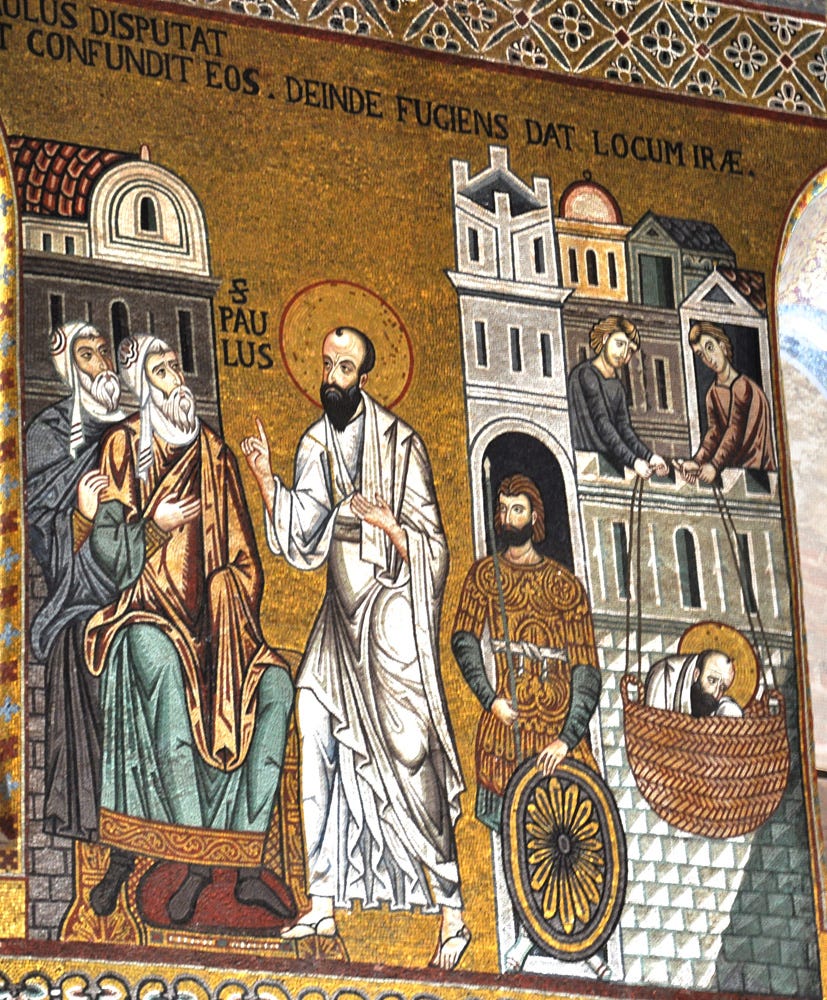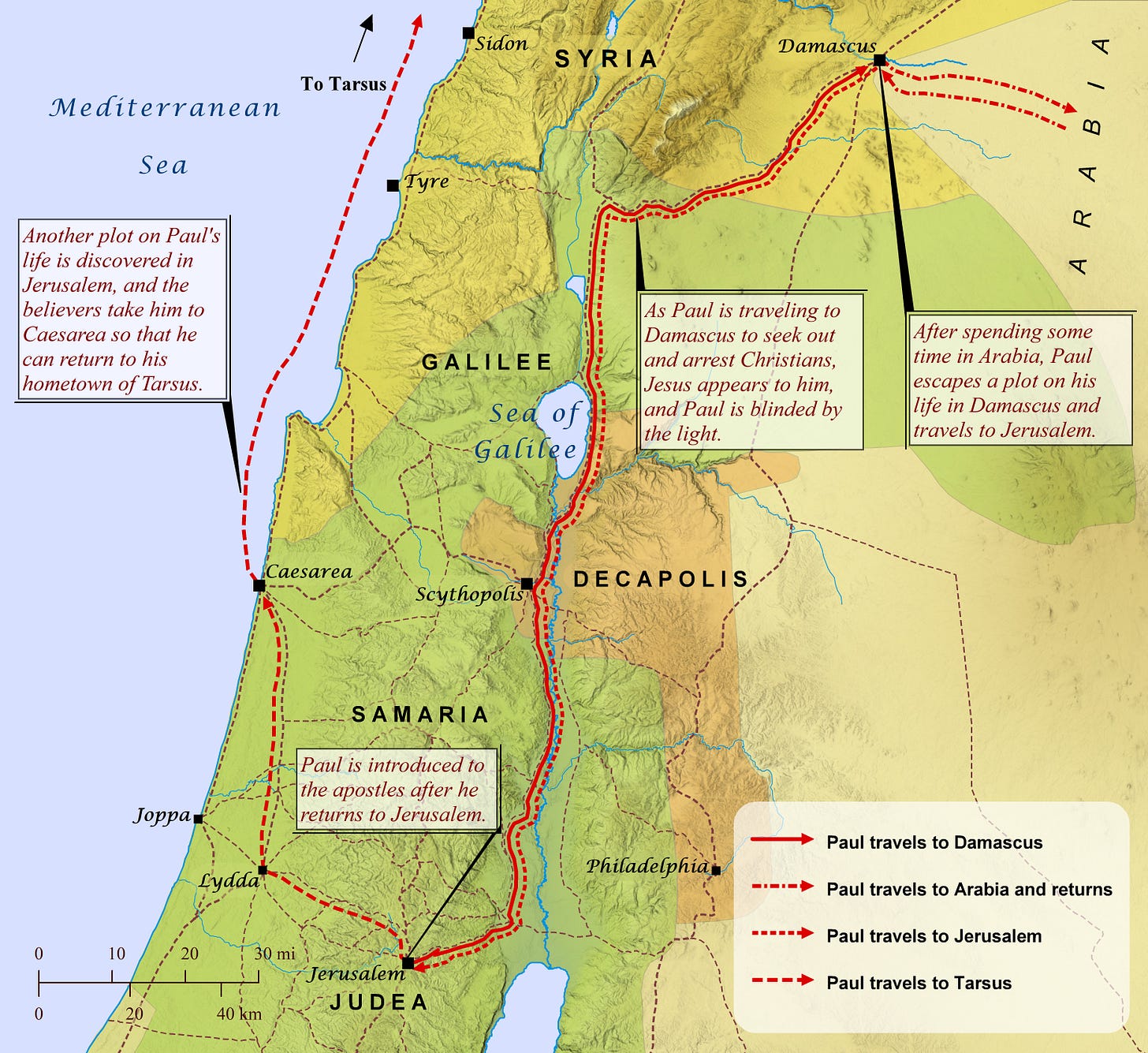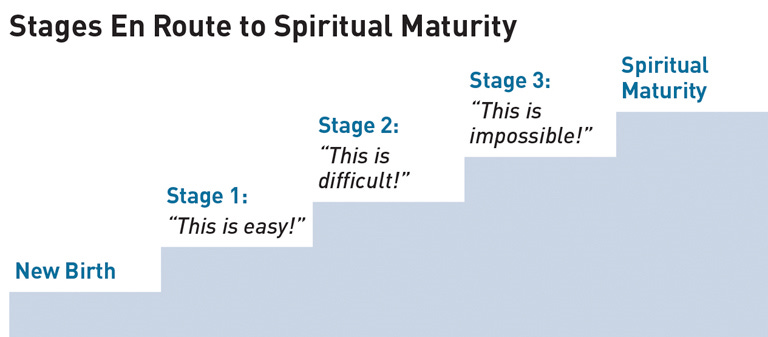A Study of Acts: Saul Preaches in Damascus
Acts 9:19b-31 - Saul shows us how spiritual maturity takes place. Also, our faith is a powerful dynamic, between fear of the Lord and the comfort of the Holy Spirit.
“Now for several days he was with the disciples who were at Damascus, and immediately he began to proclaim Jesus in the synagogues, saying, “He is the Son of God.” All those hearing him continued to be amazed, and were saying, “Is this not he who in Jerusalem destroyed those who called on this name, and who had come here for the purpose of bringing them bound before the chief priests?” But Saul kept increasing in strength and confounding the Jews who lived at Damascus by proving that this Jesus is the Christ.
When many days had elapsed, the Jews plotted together to do away with him, but their plot became known to Saul. They were also watching the gates day and night so that they might put him to death; but his disciples took him by night and let him down through an opening in the wall, lowering him in a large basket. When he came to Jerusalem, he was trying to associate with the disciples; but they were all afraid of him, not believing that he was a disciple.
But Barnabas took hold of him and brought him to the apostles and described to them how he had seen the Lord on the road, and that He had talked to him, and how at Damascus he had spoken out boldly in the name of Jesus. And he was with them, moving about freely in Jerusalem, speaking out boldly in the name of the Lord. And he was talking and arguing with the Hellenistic Jews; but they were attempting to put him to death. But when the brethren learned of it, they brought him down to Caesarea and sent him away to Tarsus. So the church throughout all Judea and Galilee and Samaria enjoyed peace, being built up; and going on in the fear of the Lord and in the comfort of the Holy Spirit, it continued to increase.”
Acts 9:19b-31 NASB1995
Saul immediately begins preaching in the synagogues in Damascus, proclaiming Jesus as the Son of God. This had to be a sight to behold - Saul was well-known for his enthusiasm in prosecuting the followers of Jesus but instead he gets in front of the members at these synagogues and proclaims Jesus as the Christ and Son of God. I love this description of the scene from John Philips in Precept Austin
We can well picture what happened. News of his arrival would cause an immediate stir. Here was the grand inquisitor of the Sanhedrin, armed with documents demanding full cooperation of the faithful in the task entrusted to him of rooting out heresy. The ruler of the synagogue would be deferential. It was not every day an accredited agent of the Sanhedrin crossed the threshold of his synagogue. Saul would be given the chief seat. Every eye would be on him. Some would gaze at him with approval, others with apprehension. In due course Saul would beckon for the Scriptures to be handed to him. He would stand and read a passage, hand back the scroll, and face the congregation. A hush would fall. Now it was coming - a denunciation of the new sect, reasons for regarding it as heresy, fierce invective against Jesus of Nazareth and of the common fisherfolk who headed the apostasy in Jerusalem, news of measures actively under way in the capital to put an end to the cult, and a demand that those knowing of any Christians in Damascus put their knowledge in Saul's hands on pain of sharing the fate of the Christians. But instead, taking the reading of the day as his text, Paul preached Christ to the people, proving that Jesus is the Son of God. Their astonishment must have known no bounds. (See Exploring Acts: An Expository Commentary)
Saul’s relentless and untiring enthusiasm, first for the arrest and purging of Christians, then for preaching Christ, is so amazing. He grows in spiritual strength and confounds the Jews in Damascus with his preaching. This passage in Acts actually condenses a few years of time that is better explained in Galatians; Saul actually goes to Arabia for a period of time (probably at least two years) and then returns to Damascus. Here is a map of those early travels from Biblemapper.com:
After “many days” (in Arabia) Saul returns to Damascus and a plot is discovered against his life. He is lowered in a basket from the wall of the city (also seen in the mosaic artwork at the top). Here is what Enduring Word says about this event, one of many escapes that will happen during this apostle’s life (and sometimes he doesn’t escape):
Now after many days were past, the Jews plotted to kill him. But their plot became known to Saul. And they watched the gates day and night, to kill him. Then the disciples took him by night and let him down through the wall in a large basket.
After many days were past: In Galatians 1:13-18, Paul explained more about what happened during these many days. He described how he went to Arabia for a period of time, and then returned to Damascus. After his return to Damascus, he went to Jerusalem. Paul spent a total of three years in Damascus and Arabia (Galatians 1:18); truly these were many days.
In 2 Corinthians 11:32-33, Paul referred to this incident and mentions it happened under Aretas the king. This means that this escape from Damascus happened between A.D. 37 and 39. So, taking into account the three years mentioned in Galatians 1:18, and that this incident happened at the end of those three years, we can surmise that Paul was converted sometime between A.D. 34 and 36.
The Jews plotted to kill him: This essentially began the many things he must suffer for My name’s sake the Lord spoke of in Acts 9:16. Saul now was the persecuted instead of the persecutor.
But their plot became known to Saul: If Saul now knew what it was to be persecuted for his faith, he also knew the mighty deliverance of God. Saul enjoyed divine protection until his ministry was complete before God.
The disciples took him by night and let him down through the wall in a large basket: Saul indeed knew divine protection in the midst of persecution, but he also learned that God’s deliverance often comes in humble ways. There is nothing triumphant about sneaking out of a city by night hiding in a large basket.
“It was the beginning of many escapes for Paul, and sometimes he didn’t quite escape. Sometimes they caught him, imprisoned him, beat him. He did indeed have to suffer many things for Jesus’ sake.” (James Montgomery Boice).
Saul makes his way to Jerusalem and tries to associate with the apostles but they are not having it - they still don’t trust this man after three years and in spite of the stories of his preaching in Damascus. Fortunately, Barnabas steps into the picture and brings him to the apostles where his conversion story is told. Saul then begins preaching in Jerusalem freely and boldly. He gets into trouble arguing with the Hellenistic Jews and is the target of death plots again (raising the question about whether he is a Hellenistic Jew). The disciples decide to send him through Caesarea to Tarsus (his home town). This is the last we hear of Saul for a while in Acts, as he spends between eight and twelve years in Tarsus before his first missionary journey to the church at Antioch (again with Barnabas). Saul is experiencing the stages to spiritual maturity that we should all go through and for him it takes quite a length of time. This is wonderfully presented by this graphic and words from Chuck Swindoll in Precept Austin:
I am convinced that all Christians must pass through three stages en route toward spiritual maturity. While everyone must pass through each stage, no one experiences them in the same way. Some zip right through the first, only to get stuck in the second. Others spend most of their lives trudging through the third and never quite reach full maturity. Regardless, the stages of growth are common to all—including Saul of Tarsus, perhaps the most notable Christian in all of history. In Acts 9, we see a synopsis of his spiritual growth:
• “This is easy!” (Acts 9:19-22)—Saul had great success debating his Jewish brethren in the synagogues. His natural abilities, great intellect, and extensive knowledge equipped him to outwit the finest minds of his day.
• “This is difficult!” (Acts 9:23-25)—Saul became the target of assassination plots and had to flee the city. As Dr. Stanley Toussaint writes, “Saul’s plans for persecuting Christians in Damascus took a strange turn; he had entered the city blind and left in a basket! Ironically he became the object of persecution.”
• “This is impossible!” (Acts 9:26-30)—Saul returns to Jerusalem to find no place among his old peers in the temple and no welcome in the understandably suspicious community of Christians. This portion of Paul’s spiritual journey took as long as four years to complete. Longer, if you include the decade he spent in his hometown of Tarsus. Eventually, he did reach that critical milestone of spiritual maturity at which point a believer not only accepts the “impossible” standards of the Christian life but learns how to thrive in his or her helplessness through the power of the Holy Spirit. It could be said that a Christian doesn’t really begin to experience new life until he or she starts living by this all-important perspective. (Swindoll's Living Insights New Testament Commentary - Acts) (Bold added by Precept Austin)
After Saul is sent to his home town for his safety, Luke notes that the churches in all of Judea and Samaria and Galilee were enjoying peace and were being built up and were growing in fear of the Lord and comfort of the Holy Spirit. Enduring Word has some interesting background on this period of time:
The churches throughout all Judea, Galilee, and Samaria: Acts 9 began with a zealous man breathing threats and murder against the disciples of the Lord (Acts 9:1). But God was more than able to turn this terrible threat into a great blessing. Now Luke shows that God’s work not only continued but it was strong, despite the great opposition that came against it.
Galilee: The Book of Acts tells us nothing about the planting of churches in Galilee. We don’t know who started these churches, how they did it, or all the great works of God which took place in these young churches. This reminds us that Acts is only a partial history of God’s work during this period.
The churches… had peace: This doesn’t mean that all persecution had stopped; instead, it means that they had peace in the midst of persecution.
At the end of Acts 9:31, we reach an important historical crossroads in Acts and the events of the Roman Empire. In A.D. 37, Caiaphas was replaced as high priest, first by Jonathan, then by Theophilus. In the same year, Caligula succeeded Tiberius as Roman Emperor. Caligula was bitterly hostile against the Jews and was assassinated four years later.
The churches… were edified: The word edified has the idea of being built up. The churches were growing in numbers and strength.
And walking in the fear of the Lord and in the comfort of the Holy Spirit, they were multiplied: Whenever God’s people are walking in the fear of the Lord and in the comfort of the Holy Spirit, you may expect that they will also see their numbers multiplied.
The fear of the Lord…the comfort of the Holy Spirit: Each of these are needed in the Christian walk. At any given moment a disciple of Jesus may more need the fear of the Lord or the comfort of the Holy Spirit. Often, God wants the comfortable to be afflicted (gaining the fear of the Lord) and the afflicted to be comforted (by the comfort of the Holy Spirit).
In the comfort of the Holy Spirit: [Arthur] Pierson points out that the word translated comfort here is essentially the same word translated Helper or Comforter in John 14:16 (paraclesis).
“Is it not already but too evident that the church of our day has little or no conception of the pricelessness of blessing involved in this paraclesis of the Spirit? What if once more this lesson could be learned? What ‘rest’ would the church have from internal dissension and division, from heresy and schism! What edification, ‘being built up’ on the most holy faith! What holy ‘walking in the fear of the Lord,’ what rapid multiplication, and what world-wide evangelization! There is not an evil now cursing or threatening our church life which this ‘comfort of the Holy Ghost’ would not remedy and perhaps remove.” (Arthur Pierson)
I love this dynamic, that we believers are walking simultaneously in fear of the Lord and in the comfort of the Holy Spirit. The word comfort in this passage is described as coming from the Greek word παράκλησις or paráklēsis, which has the following Biblical usages:
a calling near, summons, (esp. for help)
supplication, entreaty
exhortation, admonition, encouragement
consolation, comfort, solace; that which affords comfort or refreshment
thus of the Messianic salvation (so the Rabbis call the Messiah the consoler, the comforter)
persuasive discourse, stirring address
instructive, admonitory, conciliatory, powerful hortatory discourse
Things are changing in the world, as noted in the Enduring Word commentary. The high priest is replaced a couple of times, a vicious tyrant named Caligula is installed as the emperor and churches are casually mentioned as growing in Galilee, although Acts never explores who performed the evangelism in this area.
My next devotional explores Acts 9:32-43, Ministry and miracles of Peter.
Heaven on Wheels Daily Prayer:
Dear Lord - Please help me continue in my journey of spiritual maturity and be blessed to live in fear of You and in the comfort of the Holy Spirit. Amen!
Scripture quotations taken from the (NASB®) New American Standard Bible®, Copyright © 1960, 1971, 1977, 1995 by The Lockman Foundation. Used by permission. All rights reserved. lockman.org
Precept Austin was accessed on 10/03/2024 to review commentary for Acts 8:19-31.
Enduring Word commentary by David Guzik is used with written permission.
The Blue Letter Bible was accessed on 10/03/2024 to review the lexicon for comfort.





